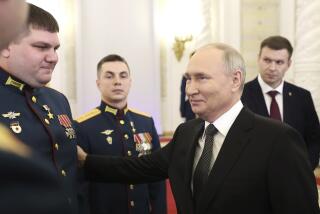An Ailing Russia Waits
- Share via
On Wednesday, Yevgeny M. Primakov said “unambiguously” that he had no interest in being Russia’s next prime minister. On Thursday, President Boris N. Yeltsin nonetheless nominated Primakov for that post, and the man who has served as foreign minister since early 1996 said he was pleased to accept. Nearly all factions in the Duma, the deeply divided lower house of parliament, welcomed the choice.
How long this support lasts will depend on what the new government does to try to calm the rising tide of social unrest brought on by a collapsing currency and the regime’s inability to meet essential public needs. Primakov’s selection ends or at least suspends the political stalemate brought on by the confrontation between a recalcitrant Duma and an erratic and clearly debilitated president. It leaves unresolved the economic crisis that has seen the ruble drastically devalued, pauperized millions of Russians and made unaffordable the imported consumer goods that have helped raise Russia’s standard of living.
Many Russians, especially those nostalgic for the Soviet era, blame the succession of market-oriented reformers whom Yeltsin brought into government for this dismal economic decline. But the real villainy lies elsewhere. A system riddled with corruption, cronyism and criminality is not the ideal place to try to institutionalize basic reforms.
Can Primakov rein in the vast and politically toxic power of the economic oligarchs who control so much of Russia’s post-Soviet wealth, and will he even try? Can he convince the Duma--itself, as the Economist notes, “full of crooks and clowns”--to pass the laws needed to encourage stable growth and effective government?
Primakov has the perceived political virtue of not harboring presidential ambitions. That undoubtedly has added to his acceptability to the Duma. Most Western governments have welcomed his selection, though behind Washington’s polite words lies some unease. Prima- kov, a former intelligence official, is a forceful advocate of Russian interests, and those are sometimes sharply at odds with U.S. policy goals. Iraq and the Balkans are two places where differences have been most prominent.
But for now it is in the area of economic policy where Primakov’s performance will be judged. If he has any kind of coherent plan in mind he has given no hint of it. In any case, because Primakov will serve at the pleasure of a president given to befuddled whims, his tenure might well prove to be brief.
More to Read
Sign up for Essential California
The most important California stories and recommendations in your inbox every morning.
You may occasionally receive promotional content from the Los Angeles Times.













